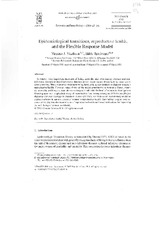Mostrar el registro sencillo del ítem
Epidemiological transitions, reproductive health, and the Flexible Response Model
| dc.contributor.author | Vitzthum, Virginia J | |
| dc.contributor.author | Spielvogel, Hilde | |
| dc.date.accessioned | 2017-03-03T13:23:06Z | |
| dc.date.available | 2017-03-03T13:23:06Z | |
| dc.date.issued | 2003 | |
| dc.identifier.uri | http://repositorio.umsa.bo/xmlui/handle/123456789/9771 | |
| dc.description.abstract | Abstract. In concert with improving standards of living since the mid-19th century, chronic and non-infectious diseases replaced infectious diseases as the major causes of mortality in more developed countries. Thus, economic development has been seen as one strategy to improve women's reproductive health. However, rates of ewo of the major contributors to women's illness, maternal mortality and breast cancer, do not correspond well with the level of economic development. Drawing upon our longitudinal study of reproductive functioning among rural Bolivians (Project Reproduction and Ecology in Provincia Aroma (REPA), we propose an evolutionary model to explain variation in certain aspects of women's reproductive health. Our findings suggest new avenues of inquiry into the determinants of reproductive health and have implications for improving the well-being of women worldwide. | es_ES |
| dc.language.iso | en | es_ES |
| dc.publisher | ECONOMICS AND HUMAN BIOLOGY | es_ES |
| dc.subject | SALUD REPRODUCTIVA | es_ES |
| dc.subject | MUJERES | es_ES |
| dc.subject | BOLIVIA | es_ES |
| dc.title | Epidemiological transitions, reproductive health, and the Flexible Response Model | es_ES |
| dc.type | Article | es_ES |

